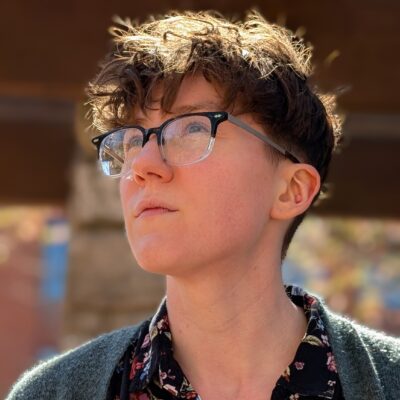Postdoc Spotlight: Bec (Rebecca) Schmitt

September 19, 2025
Bec (Rebecca) Schmitt is a postdoc in the department of molecular medicine from Buffalo, New York. They earned their Ph.D. from the University at Buffalo, and their research focuses on the molecular-level functioning of cancer cells. They are a recipient of a Postdoc Achievement Award for Excellence in Leadership as part of Cornell’s celebration of National Postdoc Appreciation Week 2025.
What is your area of research, scholarship, or work and why is it important?
My work focuses on understanding how cancer cells function at the molecular level and what that means for cancer progression. Within a tumor, there are regions that nutrients and oxygen cannot reach. For healthy tissue, these conditions would lead to cell death; however, cancer cells are able to survive and even become more aggressive. By adapting to adverse conditions, cancer cells perpetuate the growth of diseased tissue and promote the re-growth of tumors after treatment, ultimately contributing to poor patient outcomes. I aim to determine how molecules within the cancer cells work together to enable this adaptation, toward the development of improved treatment approaches.
What are the broader implications of this research, scholarship, or work?
Cancer is an incredibly complicated disease that has proven, in many cases, exceptionally difficult to treat. By gaining a greater understanding of how cancer cells overcome stressful conditions, we expect to identify potential weaknesses that we can exploit to improve treatment options. For example, if a specific molecule is critical for the adaptation of cancer cells to low oxygen levels, we can design a drug that prevents that molecule from doing its job. As a result, the tumor may be more susceptible to treatment and/or less likely to re-grow, helping to reduce the disease’s negative impact on the patient and their loved ones.
What does receiving a Postdoc Achievement Award mean to you?
Receiving the Postdoc Achievement Award for Excellence in Leadership is a tremendous honor. This recognition affirms the importance of developing non-technical skills that are often underemphasized in academic research environments. Through Cornell’s leadership training opportunities, including the Postdoc Leadership Program, I gained tools that helped me grow as a mentor and as a leader. Serving as Chair of the Cornell Postdoctoral Association for 2024–2025 allowed me to support initiatives that strengthened our community and fostered a sense of belonging. I’m deeply grateful to be recognized for contributions beyond research, efforts that reflect my commitment to building a more welcoming and supportive environment.
What hobbies or activities do you enjoy in your spare time?
I spend a lot of time reading, I love getting a peek into how other people see and interface with the word. Even works of fiction provide an alternative perspective and allow me to explore scenarios I may never experience in real life. I also enjoy spending as much time outdoors as possible; I find communing with nature helps me to appreciate the beauty of our world as well as feel centered and grounded. Some of my favorite outdoor activities are running, hiking, and swimming, but even just sitting outside is enjoyable to me.
Why did you choose Cornell?
I chose Cornell for the vast, collaborative research opportunities and an alignment in values. Coming in as a postdoc, I was looking to expand upon my previous research experience and step into a new, complementary field. I came across Rick Cerione’s lab and was immediately excited by his work to understand the molecular signals underlying cancer cell behavior. After meeting with members of the Cerione Lab, it was clear that the research environment was also very welcoming and supportive, a perfect fit. Beyond the lab itself, Cornell’s founding principle of “any person, … any study” truly resonated with me, as I am passionate about cultivating a sense of belonging for all in higher education.
What is next for you?
My goal is to become a professor at a research university and run my own multidisciplinary lab. I want to bridge the gap between basic and translational science, investigating fundamental cellular function and using the emerging knowledge to develop innovative treatment approaches. Until then, I am continuing my work here at Cornell, learning new research techniques, honing my non-technical skills, and continuing to work with the Postdoctoral Association to cultivate a welcoming and supportive postdoc community.
Do you have any advice for current graduate students?
While graduate work does require a high level of dedication and effort, it is also important to set time aside to take care of yourself. Not only will this support your well-being, but it will also ultimately improve your work. Don’t rely solely on your PI as your mentor; establish a mentoring network with people from different backgrounds, this will ensure you can always turn to someone for support. Don’t compare yourself to others; every Ph.D. is its own journey, you all have different strengths and goals. Take time to celebrate even the small wins; it is easy to get caught up in the grind, but it is important to appreciate all that you have accomplished.
